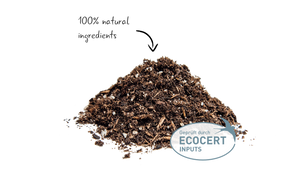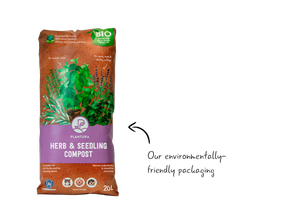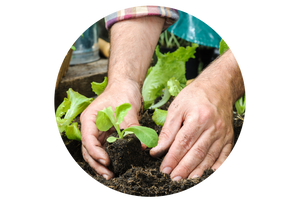Organic Herb & Seedling Compost, 20L
- Regular price
- Sale price
- Regular price
- Sale price
- In Set
- Single
Incl. VAT; free shipping on orders over £39
Frequently bought together
-23%
All Purpose Plant Food, 1.5kg
Rated 4.8 out of 5 stars
4
- Sale price
- £9.99
- Regular price
Starting at
£12.99
Incl. VAT; free shipping on orders over £39
Organic All Purpose Compost, 40L
Rated 4.8 out of 5 stars
12
- Regular price
- £16.99
Starting at
Back in stock soon
Incl. VAT; free shipping on orders over £39
Organic Tomato & Vegetable Compost, 40L
Rated 5.0 out of 5 stars
4
- Regular price
- £16.99
Starting at
Back in stock soon
Incl. VAT; free shipping on orders over £39
%
Liquid Houseplant Food, 800ml
Rated 5.0 out of 5 stars
7
- Sale price
- £8.99
- Regular price
Starting at
£10.99
Back in stock soon
Incl. VAT; free shipping on orders over £39

What is our compost for herbs made of?
Our herb compost contains 100% natural raw materials. Because our compost is free from peat, it saves up to 60% CO2 during production, compared to composts with peat. Plantura Herb & Seedling Compost is a mixture of coir pith, perlite and high-quality green compost. It also contains some calcium and magnesium fertiliser as well as a dose of animal-free plant food. Our organic compost is certified with the ECOCERT label.

What is the compost’s packaging made of?
At Plantura, we care deeply about the environment. For this reason, we are using compost bags that are made of 80% recycled plastic. Our sustainable alternative to conventional soil bags has been awarded the Blue Angel (German ecolabel). We are asking our customers to dispose of the empty bags of our organic composts in their recycling after use.

Why is the seedling compost so low in nutrients?
The more nutrients, the bigger the plants? Sounds logical, but is not necessarily the case. The low-nutrient content of this soil helps to stimulate the seedlings’ root growth. Plants need to grow strong roots first in order to absorb enough nutrients from the soil. Our Plantura Organic Herb & Seedling Compost thus has a positive effect on your plants’ development — for strong and healthy seedlings! Most herbs are light feeders and can stay in this soil long-term. But once your hungrier plants have passed the seedling stage, you can plant them into a more nutrient-rich compost, such as our Plantura Organic Enriched Compost, which is better suited to mature plants.
Why Plantura
We are a growing company based in Munich committed to bringing you effective and sustainable products. We stand for:














